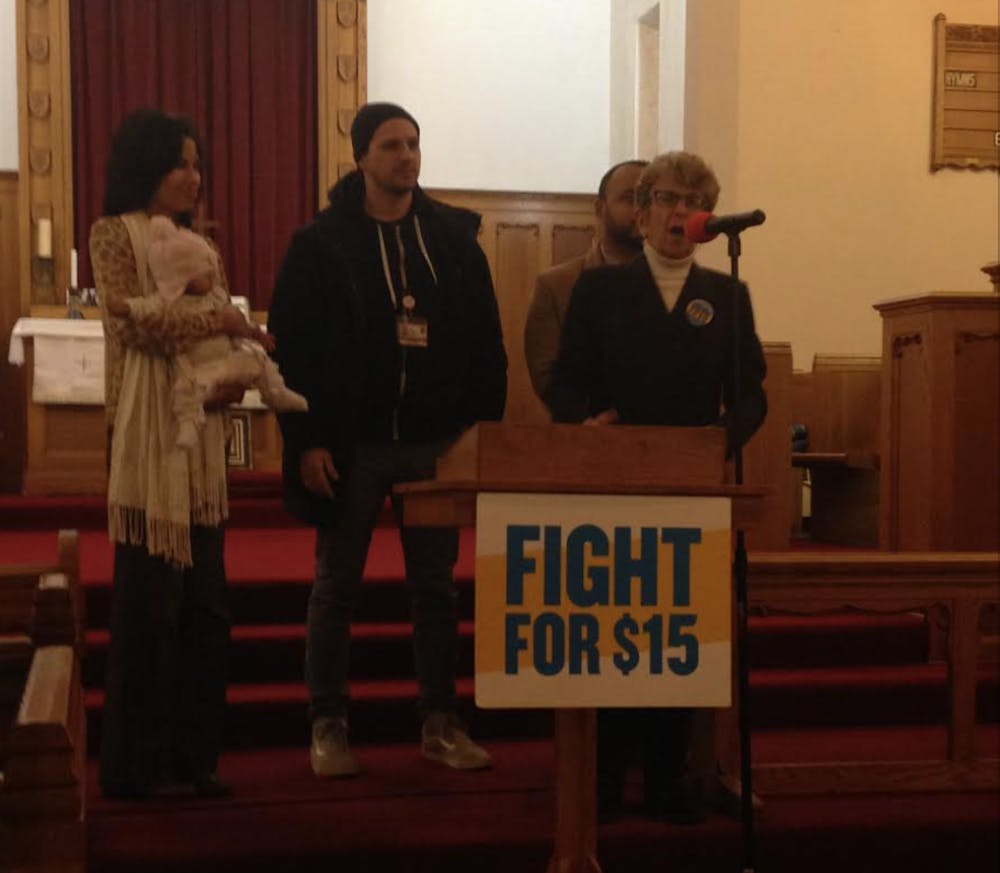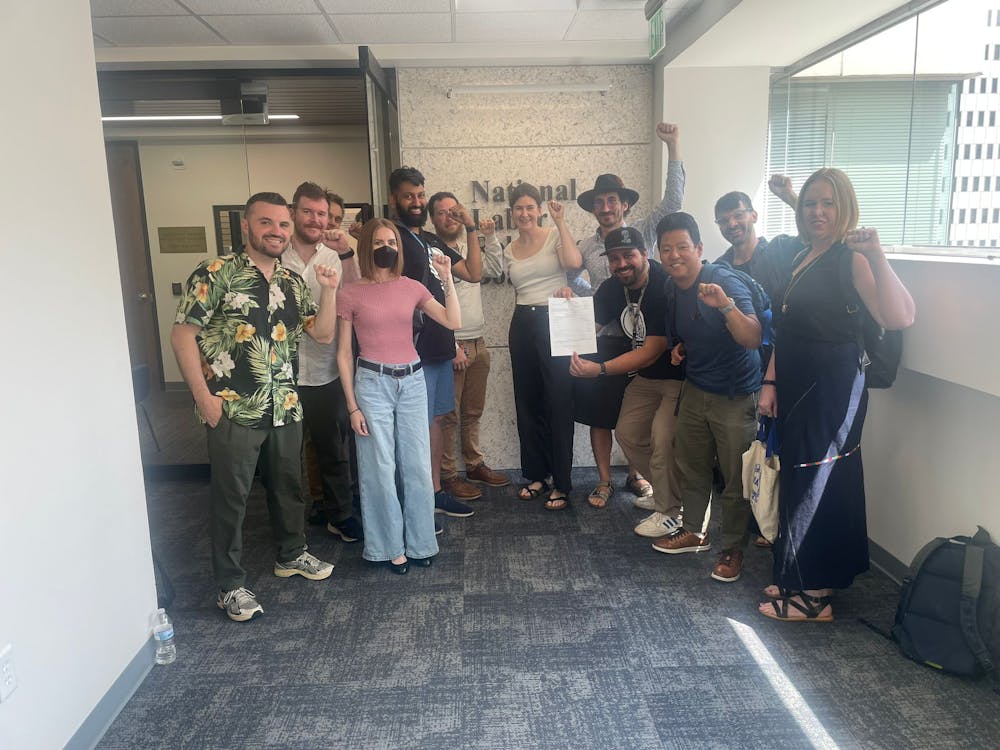Fight for $15 (FF$15) Baltimore, a coalition advocating for the city’s minimum wage to be raised from $8.75 to $15 per hour by 2022, held a rally in New Waverly United Methodist Church.
The rally on Thursday, Feb. 16 was held ahead of a March 1 City Council vote which will decide the issue.
Community members, including workers, small business owners, activists and members of City Council promoted the bill to a crowd of over 100 people, 10 of which were Hopkins students.
FF$15 Campaign Chair Ricarra Jones explained the purpose of the rally.
“We wanted to just get people energized, let them know that this campaign is on, that the fight is on. And just let them hear workers’ stories, hear why this issue is important, get them engaged and have them contacting their City Council reps. and the mayor [Catherine Pugh],” Jones said.
A resident of Baltimore for many years, Jones was inspired to co-found FF$15 after witnessing first-hand the struggles her fellow residents endured trying to make ends meet.
“It’s important to me because of the many conversations I’ve had with people [who] are constantly trying to figure out how to stretch their paychecks from week to week and from day to day and who will, at the end of the week, never have enough money left over,” she said.
Last year, FF$15 worked with City Councilwoman Mary Pat Clarke, whose district includes the Homewood Campus, to introduce a bill to raise the minimum wage, but it fell one vote short of passing. The bill was reintroduced by Clarke earlier this month and will be voted on next week.
Clarke is optimistic about the chances of the bill being passed this time around.
“We will win because justice demands it,” she said. “We will bring justice to its beginning here in Baltimore. We can afford it, and we can’t afford not to pass this legislation if we ever want to bring all the people of our city together as one whole community: self-sufficient, proud and together.”
However, Clarke and Jones agree that even if the bill passes, there is still work to be done. The bill currently includes an exemption for workers under the age of 21.
“That’s a huge issue, because there are a lot of folks who are 20... and supporting their own families and trying to work their way through college,” Jones said. “So we hope that they are no longer exempt this legislation, and we’re working really hard to change that.”
The rally featured testimonials from many workers in Baltimore struggling to make a living off the city’s current minimum wage of $8.75.
A Hopkins security guard named John criticized the University’s treatment of its security staff and explained why he joined 32BJ SEIU, a labor union with chapters across the country.
“I took a stance when I first heard about the union being organized, and I got involved. I’m so glad I did because when I first came to the campus, the officers were treated like they were actual slaves,” he said. “I had to go to Washington, D.C. and bargain our contract, and it took almost forever to do that, because I never encountered a wicked bunch of people such as I work for at JHU. They did not want to give us anything, but I fought and I continue to fight to this day. $15 means you have to fight.”
Junior Jessa Wais, one of three student speakers at the rally, discussed her involvement in working to raise the minimum wage on campus through the recently formed Student Labor Action Coalition (SLAC), which is composed of students, workers, union representatives and community organizations.
According to Wais, SLAC is calling on the University to meet three demands: a $15 minimum wage, a stipulation ensuring that workers will retain their jobs regardless of contract changes and for contracted workers to receive the same housing benefits as non-contracted workers.
“Hopkins is a well-renowned public health institution that constantly boasts about its commitment to Baltimore,” Wais said. “If they truly care about the city of Baltimore, then they will meet our coalition’s three demands. As the top employer in the state, Johns Hopkins actively supporting a $15 minimum wage, and supporting it before 2022, would set an important precedent for all employers in the city.”
Wais believes hesitance to raise the minimum wage to $15 stems from greed rather than from an inability to implement such a change.
“It just doesn’t make sense for a minimum wage to be below a livable wage,” Wais said. “Both at Hopkins and throughout the city, this is an issue of priorities. The money is there. We just have to fight to make sure workers and their families are prioritized over profit margins.”
Hopkins alum Rodney Burris, a professor at the Community College of Baltimore County Essex, agreed that fighting for a $15 minimum wage is a necessity, but claimed he had not always held that view.
“This was a process for me. I absolutely believed we needed to have an increase in minimum wage from our college years, but what I didn’t want to happen was the adverse effect of companies rais[ing] the price of their goods and services, and it nullifies the increase,” Burris said. “Well, then I thought about it... and it occurred to me the prices of goods and services have been going up regardless... So, then I was like, ‘Okay, let’s make it happen.’”
However, Burris second guessed himself before ultimately becoming an advocate.
“I thought again, well, what if that causes... a decrease in jobs, in hours, in hiring? So I went back and forth,” Burris said. “And then at the end of the day, I was like, you know what, we have to make this happen because civically-minded companies, small businesses, large corporations don’t take that approach... They’re in it to win it.”
In order to dispel the idea that all business owners oppose a salary increase, FF$15 invited a local small business to speak at the rally. Jacquelyn Jones Ziegler, owner of the adult entertainment store Sugar, said that she has paid her employees above minimum wage since opening in 2007. She explained how paying higher salaries can benefit business owners.
“The truth is when you pay your people fairly, when you treat them decently, shockingly people work harder and your business is more successful,” Ziegler said. “When my co-workers don’t have lights at home, they don’t sleep. They don’t eat well. And then they come to work, and they’re not able to do well. And that’s no good for me, and that’s no good for them.”
Rachelle Bland, owner of Baltimore Blossoms, said she has also paid her employees above minimum wage since opening for moral reasons.
“We are our neighbors’ keeper, so you have to do unto others what you want someone to do unto you,” she said. “We’re all in it together.”
The rally concluded with testimony from members of Fight for $15 Philadelphia who traveled to Baltimore specifically for the event. Ivory Bishop, a Kentucky Fried Chicken employee, shared her story of straining to support her family on $7.75 an hour, 50 cents above Philadelphia’s current minimum wage.
“Fight for $15 for me means a lot because before I joined this three years ago, I was lost. I was another struggling African-American woman in poverty trying to raise two children. When Fight for $15 came upon me, it was like a new light,” Bishop said. “It brought new meaning to my life. It’s something I can fight for not only for me and my children [but also for] my children’s future and their children’s future and so on and so on.”





